|
|
|
Sort Order |
|
|
|
Items / Page
|
|
|
|
|
|
|
| Srl | Item |
| 1 |
ID:
097334
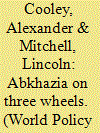

|
|
|
| 2 |
ID:
066665
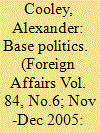

|
|
|
| 3 |
ID:
091405
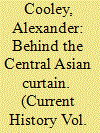

|
|
|
|
|
| Publication |
2009.
|
| Summary/Abstract |
Recent events have made Moscow's attempts to preserve its exclusive regional control seem no longer feasible or cost-effective.
|
|
|
|
|
|
|
|
|
|
|
|
|
|
|
|
| 4 |
ID:
137229
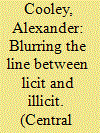

|
|
|
|
|
| Summary/Abstract |
The anti-corruption norm in both scholarship and the policy world has too narrowly focused on the domestic and institutional context of bribe-taking and public corruption. Instead, we argue that corruption in the contemporary global economy requires a multiple set of connected transactions, processes, and relationships that take place within informal transnational networks that blur the line between illegal and legal activities. These networks include multinational companies, elites in host countries, offshore financial vehicles and conduits, middlemen and brokers, and destination financial institutions. We examine how these actors operate in Central Asia, a region that is widely identified as corrupt, yet is rarely understood as embedded in the types of global processes, offshore connections and transnational links specified in our analysis. Examples of offshore centers in tax planning from Central Asia, and partial results from a field experiment based on impersonating high corruption risks from four Central Asian states, provide evidence for how the various actors in transnational financial networks structure their dealings. We then present two brief illustrative cases of how these transnational networks have operated in energy explorations services in Kazakhstan and telecommunications contracts in Uzbekistan. Our findings have theoretical, practical, and normative implications for scholars and practitioners of Central Asian international political economy and other ‘high risk' regions.
|
|
|
|
|
|
|
|
|
|
|
|
|
|
|
|
| 5 |
ID:
126321
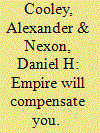

|
|
|
|
|
| Publication |
2013.
|
| Summary/Abstract |
Many commentators refer to the U.S. overseas network of military installations as an "empire," yet very few have examined the theoretical and practical significance of such an analogy. This article explores the similarities and differences between the basing network and imperial systems. We argue that American basing practices and relations combine elements of liberal multilateralism with "neo-imperial" hegemony. Much, but far from all, of the network shares with ideal-typical empires a hub-and-spoke system of unequal relations among the United States and its base-host country "peripheries." But Washington rarely exercises rule over host-country leaders and their constituents. Historical examples suggest that this combination of imperial and non-imperial elements has rendered the United States vulnerable to political cross-pressures, intermediary exits, and periodic bargaining failures when dealing with overseas base hosts. Moreover, globalizing processes, especially increasing information flows and the transnational networking of anti-base movements, further erode U.S. capacity to maintain multivocal legitimation strategies and keep the terms of its individual basing bargains isolated from one another. Case studies of the rapid contestation of the terms of the U.S. basing presence in post-Soviet Central Asia and post-2003 Iraq illustrate some of these dynamics.
|
|
|
|
|
|
|
|
|
|
|
|
|
|
|
|
| 6 |
ID:
099524
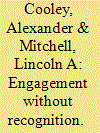

|
|
|
| 7 |
ID:
188196
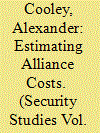

|
|
|
|
|
| Summary/Abstract |
In their ambitious article, Joshua Alley and Matthew Fuhrmann ask how “alliance commitments affect US military spending.” Their answer: each alliance, on average, adds $11–$22 billion to the annual defense budget. Given the number of US defense pacts, that would mean formal alliances accounted for over $735 billion of the 2019 defense budget.1 This finding, if true, suggests that Donald Trump was right to claim that alliances are “much too costly for the US.”2
|
|
|
|
|
|
|
|
|
|
|
|
|
|
|
|
| 8 |
ID:
098780
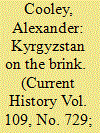

|
|
|
| 9 |
ID:
086330


|
|
|
|
|
| Publication |
2009.
|
| Summary/Abstract |
The tragic August conflict between Georgia and Russia has initiated a wave of accusations about which side was to blame for the outbreak of full-scale war. The war and its aftermath have ratcheted tensions between the West and Russia, as the international community pressures Moscow to withdraw its troops from Georgian territory and abide by its ceasefire obligations. Russia's reckless decision to recognize the independence of South Ossetia and Abkhazia not only contravenes international law regarding sovereign statehood, but if allowed to stand, would establish the unacceptable precedent that countries can justify military intervention in the territory of a neighbor by invoking the rights of their ethnic citizens. Not surprisingly, Moscow has found little support in the international community for its heavy-handed actions, even among countries friendly to Russia.
|
|
|
|
|
|
|
|
|
|
|
|
|
|
|
|
| 10 |
ID:
181821
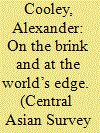

|
|
|
|
|
| Summary/Abstract |
Western scholarship on the foreign policies of the post-Soviet Central Asian states has consistently framed the region as marginalized but ripe for Great Power influence and poised to assume a more important role in world affairs. This article explores the analytical assumptions, institutional agendas, and geopolitical drivers of scholarly and policy portrayals of Central Asia, emphasizing the key role played by the Western military intervention in Afghanistan in 2001 and the region’s supporting role as logistics providers and security partners. The ensuing local and regional reactions to this intensifying securitization prompted International Relations scholars to explore the limits of Western governance and the liberal international order in Central Asia and highlight the rise of new counter-ordering norms, organizations and networks. This body of work has made important contributions to the now growing literature on post-Western International Relations, but still excludes the voices of many Central Asian scholars themselves and overlooks important regional topics and new analytical approaches.
|
|
|
|
|
|
|
|
|
|
|
|
|
|
|
|
| 11 |
ID:
168927
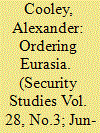

|
|
|
|
|
| Summary/Abstract |
Following the collapse of the Soviet Union, the post-Communist states were integrated at light speed into the organizations, institutions, and norms of the liberal international order. During the 1990s, Western regional organizations, nongovernmental organizations, and democratic norms became important pillars of an international security and governance architecture that seemingly locked in the post-Communist states, whose regimes were eager to derive the material benefits and status of anchoring themselves into the US-led liberal hegemonic order. Since 2005, however, many of the post-Communist governments increasingly view these Western pillars as threatening their domestic authority and regime survival and have actively supported Russian-led initiatives to curtail such organizations and norms’ reach and influence. As a result, the ecology of the post-Communist space has transformed from one where the liberal order was briefly dominant to one where new illiberal regional organizations, practices, and counternorms have flourished and now regularly interact with liberal counterparts.
|
|
|
|
|
|
|
|
|
|
|
|
|
|
|
|
| 12 |
ID:
083995
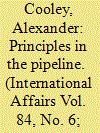

|
|
|
|
|
| Publication |
2008.
|
| Summary/Abstract |
After a decade of relative neglect post-Soviet Central Asia has become a foreign policy priority for the transatlantic community. Both the United States and Europe have engaged with the region in recent years in pursuit of new strategic interests, including maintaining military basing access in support of coalition operations in Afghanistan and securing the export of Central Asian oil and gas to the West. Despite this period of renewed engagement, however, the quality of democratic governance within the region remains poor, especially in comparison with other post-communist regions that successfully completed their political transitions. In fact, the United States and the European Union have often tempered promoting their Central Asian democratization agendas in order to maintain access to these strategically important fixed assets. The transatlantic struggle to balance the pursuit of strategic interests and democratic values has been rendered more difficult by Russia's recent resurgence as a regional power. Backed by the Central Asian governments, Moscow has challenged the purpose and influence of western-based international and non-governmental organizations in the region, thereby further diminishing the transatlantic community's capacity to promote sustained democratic reforms.
|
|
|
|
|
|
|
|
|
|
|
|
|
|
|
|
| 13 |
ID:
141561


|
|
|
|
|
| Summary/Abstract |
When the Berlin-based group Transparency International released its annual ranking of international corruption levels in December 2014, China’s Ministry of Foreign Affairs responded with a blistering statement. Chinese authorities were upset that their country had sunk from 80th to 100th place on the watchdog’s influential Corruption Perceptions Index, even though Beijing was pursuing a high-profile anticorruption campaign . “As a fairly influential international organization,” a Chinese Foreign Ministry spokesperson said , “Transparency International should seriously examine the objectiveness and impartiality of its Corruption Perceptions Index.”
|
|
|
|
|
|
|
|
|
|
|
|
|
|
|
|
| 14 |
ID:
186768
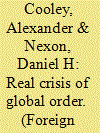

|
|
|
| 15 |
ID:
168871
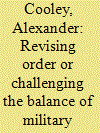

|
|
|
|
|
| Summary/Abstract |
Unimensional accounts of revisionism – those that align states along a single continuum from supporting the status quo to seeking a complete overhaul of the international system – miss important variation between a desire to alter the balance of military power and a desire to alter other elements of international order. We propose a two-dimensional property space that generates four ideal types: status-quo actors, who are satisfied with both order and the distribution of power; reformist actors, who are fine with the current distribution of power but seek to change elements of order; positionalist actors, who see no reason to alter the international order but do aim to shift the distribution of power; and revolutionary actors, who want to overturn both international order and the distribution of capabilities. This framework helps make sense of a number of important debates about hegemony and international order, such as the possibility of revisionist hegemonic powers, controversies over the concept of ‘soft balancing’, and broader dynamics of international goods substitution during power transitions.
|
|
|
|
|
|
|
|
|
|
|
|
|
|
|
|
| 16 |
ID:
080758
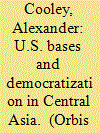

|
|
|
|
|
| Publication |
2008.
|
| Summary/Abstract |
Under the Pentagon's current Global Defense Posture Review (GDPR), the United States is reducing its forces in several major Cold War base hosts and establishing a global network of smaller, more flexible facilities in new areas such as Central Asia, the Black Sea and Africa. Drawing upon recent evidence from the Central Asian base hosts of Kyrgyzstan and Uzbekistan, this article cautions that these new U.S. overseas bases, despite their lighter footprint and regardless of the prevailing security situation, risk becoming enmeshed in the local struggles and political agendas of elites within these hosts. Periods of turbulent democratic transition and regime instability may encourage host country politicians to challenge the legitimacy and terms of the U.S. basing presence for their own political purposes. These are important lessons for U.S. planners who are simultaneously promoting democratization while they negotiate basing and military access agreements in these same politically volatile hosts
|
|
|
|
|
|
|
|
|
|
|
|
|
|
|
|
|
|
|
|
|